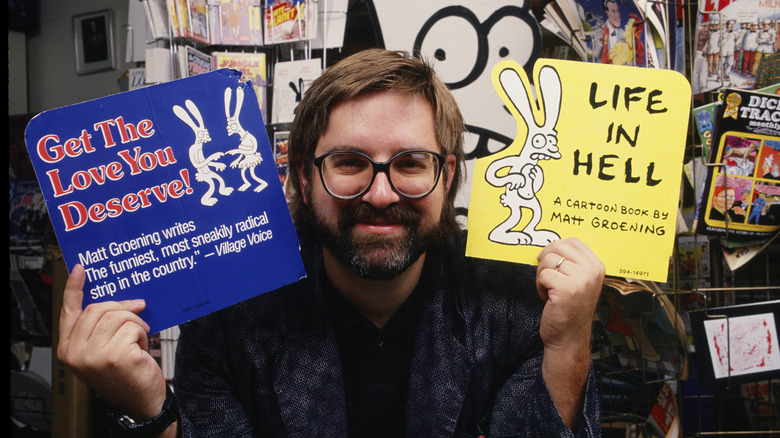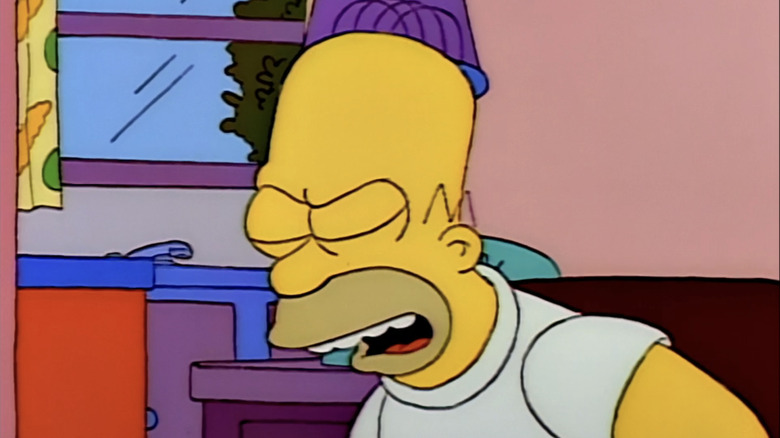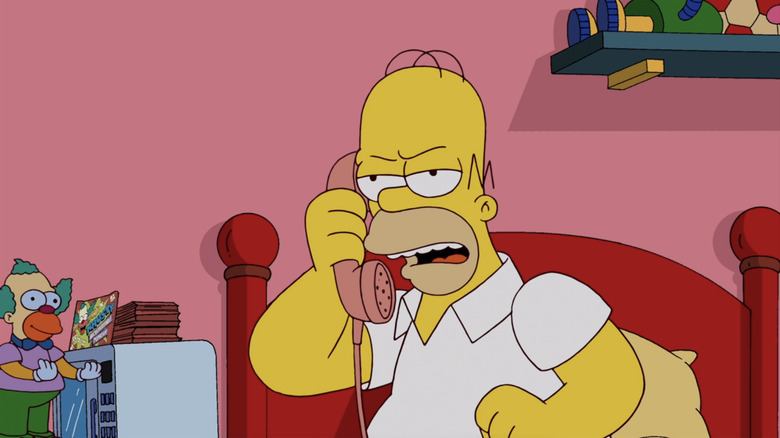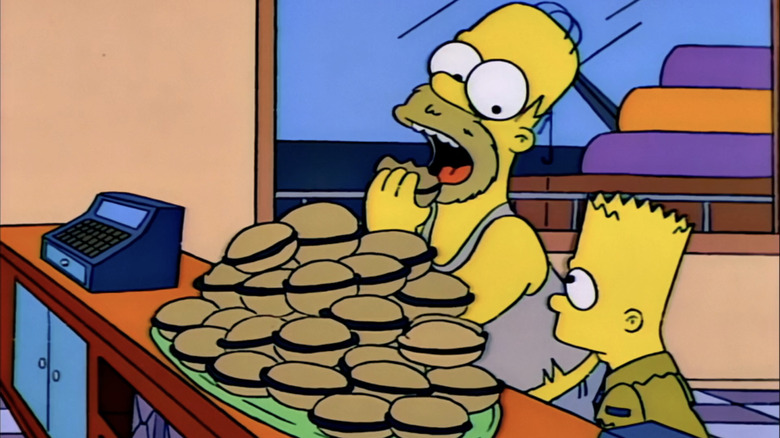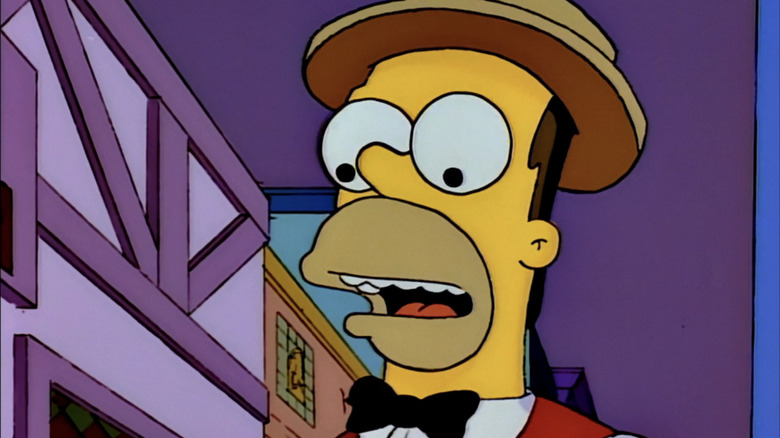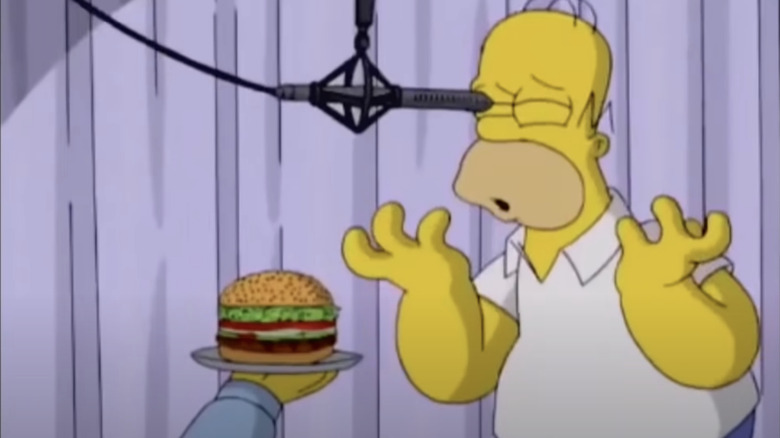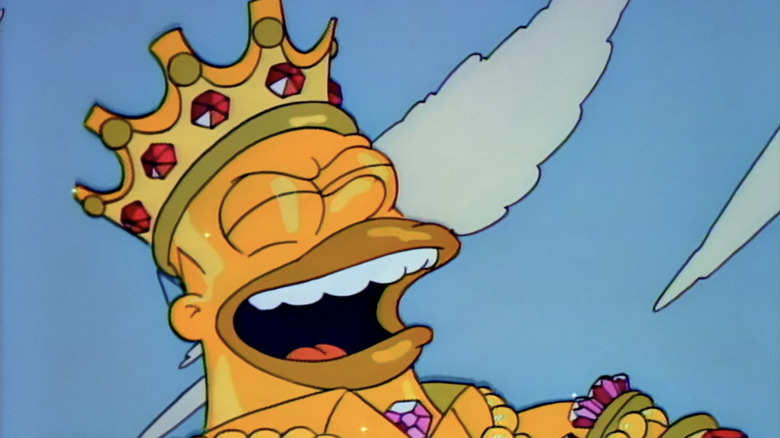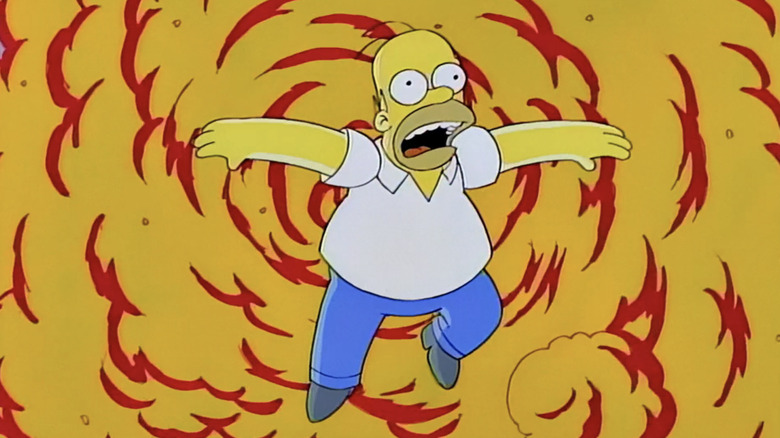The Untold Truth Of Homer Simpson
He's a family man, but not a family guy. He's the son of not just Abe and Mona, but Matt and Dan. He lives in a town with a gorge, a chasm, and a mountain range, and he's fallen down them all. He never graduated high school but yelled his way into a job as a nuclear technician. He once fought a president in the sewer and maimed a college dean. His consequence-free life once literally annoyed a coworker to death. He's a Grammy-winning recording artist and Johnny Cash is his spirit animal. He is none of us, he is all of us. He is Homer Simpson.
Homer has anchored the iconic Fox animated sitcom "The Simpsons" since 1990 and has been a loving if negligent husband to Marge and father to Bart, Lisa, and Maggie for even longer, going back to the late 1980s variety series "The Tracey Ullman Show." Many of the show's millennial and Gen Z fans have never lived in a world in which Homer and the rest of the citizens of Springfield haven't provided a funhouse mirror to our foibles and weaknesses. They've even predicted the future a few times.
Still, nothing comes from nowhere, and even a cultural institution like Homer Jay Simpson has a beginning, and perhaps a few things you didn't know about this former minor league baseball mascot turned beer baron turned — well, we'll get to that. Here is the untold truth of Homer Simpson.
Life in Hell
Before Homer or any other Springfield resident was even a glimmer in his eye, cartoonist Matt Groening was best known for the comic strip "Life in Hell." Born and raised in the Pacific Northwest, Groening moved to Los Angeles as a young man, working odd jobs and writing music reviews for the alt-weekly paper the Los Angeles Reader. He began drawing a comic strip featuring anthropomorphic rabbits grousing about daily life in the city and sent copies back to his friends in Oregon. The comics soon caught on, and in 1980 the Los Angeles Reader began to publish them (via Salon).
Several years later, producer James L. Brooks, best known at the time for "The Mary Tyler Moore Show" and "Terms of Endearment," approached Groening about producing an animated version of "Life in Hell." The idea was that the strips would be adapted as short scenes in between the live-action sketches in a new show starring British comedian Tracey Ullman on the fledgling Fox network.
Concerned about losing the rights to his strip if it was produced for television, Groening instead pitched Brooks a brand new idea about the misadventures of a suburban American. That family was named after his own parents and siblings, sisters Lisa and Maggie, his mother Margaret (or Marge), and his father — Homer.
Born in Chicago
Groening may have been from Oregon, and many of Springfield's notable names are references to the Portland area, but Homer Simpson was born in Chicago — or rather, actor Dan Castellaneta, the voice of Homer for over 30 years, was. When Groening's earliest "The Simpsons" shorts were produced for "The Tracey Ullman Show" in 1987, the characters' voices were provided by cast members of Ullman's ensemble. Actors delivering those early lines included Castellaneta as lazy dad Homer, Julie Kavner as fretful mom Marge, Yeardley Smith as brainy sister Lisa, and Nancy Cartwright as prankish brother Bart.
Born at Roseland Community Hospital on Chicago's south side and raised in nearby suburb Oak Park, Castellaneta studied art at Northern Illinois University. He eventually enrolled in improv classes at the famed Second City theater, the sketch comedy incubator that has produced such megastars as John Belushi, Stephen Colbert, and Tina Fey. He performed as part of the theater's mainstage cast from 1983 to 1987 alongside comedic actor Richard Kind and writer Deb Lacusta (who would later become his wife).
Anyone who has watched any of "The Simpsons" knows that Castellaneta can be amazingly funny, but it was actually his pathos that won him a role in Tracey Ullman's ensemble. "He made me cry, actually, rather than laugh," she told the Los Angeles Times in 1999, recalling his audition for the show. "There were flashier performers that night. But I don't like that, really."
Walter Matthau
"The Simpsons" has evolved considerably since those crude early shorts on "The Tracey Ullman Show." In the beginning, Marge's dress was a long-sleeved floral print rather than the strapless number we know and love, and by and large, everyone is a bit messier than they would eventually end up. Despite that, each of the Simpson family is recognizable as themselves even in their earliest appearances, and Cartwright, Smith, and Kavner's voices for their respective characters have more or less remained unchanged.
The biggest exception to that rule, though, is Homer, who originally had a very different sounding voice. Castellaneta initially based his Homer voice on legendary actor Walter Matthau ("The Odd Couple," "The Taking of Pelham One Two Three"), emphasizing Homer's role as a put-upon, slightly annoyed sitcom dad. He continued to use the Matthau voice through the Ullman shorts and the first season of "The Simpsons" on Fox, but as the series continued, he found that the grind of voicing an entire season of half-hour episodes made the voice impractical.
"We'd do nine to 10 hours of recording, and I couldn't sustain that voice over that period of time," Castellaneta told MTV in 2007. "So, I had to find something a little more comfortable to do."
Annoyed grunt
The early "Simpsons" craze focused on Bart and his various catchphrases like "Don't have a cow, man!" and "Eat my shorts." However, it was Homer's own inimitable slogan that has passed on to not just wide usage in pop culture, but even the Oxford English Dictionary: "D'oh!" Castellaneta uttered his version of the famous exclamation on one of the later "The Tracey Ullman Show" shorts. It was written in the script as "annoyed grunt," and over the years that has remained its official spelling in "The Simpsons" scripts, as seen in show titles like Season 11's "E-I-E-I-(Annoyed Grunt)."
So if Castellaneta just had "annoyed grunt" to work with from the script, where did "D'oh!" come from? The exclamation is actually an homage to Scottish comic actor James Finlayson, who appeared in dozens of short films featuring the legendary duo Laurel and Hardy throughout the 1930s and 1940s. Finlayson's version of the catchphrase was more of a double-take followed by a longer, more exasperated "D'oooooh!" used as a self-censoring form of the word "damn."
Performing it as Finlayson did would have taken too long in animation, however, so Castellaneta and Groening settled on a faster, more angry variation. The catchphrase became instantly recognizable, even within the world of the show, as when Mr. Burns stages a fake Simpsons family in the Season 5 episode "Burns' Heir."
Secret identity
Homer has a contentious relationship with his son Bart, defined by a mutual lack of respect, occasional affection, and more than a few strangulations. If Bart feels nothing but contempt for his father, especially in the early days of the series, he feels nothing but respect for Krusty the Clown, the chain-smoking degenerate children's entertainer whose afternoon local TV show is appointment viewing for the kids of Springfield. The dichotomy between Homer and Krusty was intentional, as are the many similarities in their character designs — they were originally intended to be the same person.
"The original idea behind Krusty the Clown was that he was Homer in disguise," Groening told Entertainment Weekly in 2007. "If you look at Krusty, it's just Homer with extended hair and a tuft on his head." The idea, however, never gained traction beyond the design stage and was eventually dropped.
Still, there are vestiges of the Homer and Krusty connection throughout the series, most notably in the Season 6 episode "Homie the Clown," in which Krusty opens a clown college to pay his gambling debts and Homer becomes his star pupil. However, when mobster Fat Tony (Joe Mantegna) comes to collect on Krusty's debts, he ends up grabbing the wrong clown, leading to a case of mistaken identity and one of the series' great non-jokes, "I'm seeing double! Four Krustys!"
You're only as old as you feel
"The Simpsons" has been on the air for over 30 years, existing in a kind of floating timeline, an eternal present in which Bart and Lisa are always ages 10 and 8, respectively. However, "The Simpsons" is also, despite its trips to space and musical numbers, a grounded family story at heart and a satire that aims at our current moment. That means that when the show premiered in 1990, Homer was established to be 34 years old and born in 1956.
Over the decades, Homer has remained in general a baby boomer, with a father who fought in World War II, a childhood in the 1960s, and coming of age and falling in love with Marge as a high schooler in the 1970s. Every so often an episode like "That '90s Show" will attempt to recalibrate Homer and Marge's backstory for a new era, but for the most part, making sense of the show's history requires an elastic view of the late 20th century.
Though most of the characters have stayed the same age since 1990, Homer's age has crept up ever so slightly. The 1992 episode "Lisa the Beauty Queen" establishes in dialogue that he is 36, while the 1995 episode "A Star is Burns" has Homer's best friend and high school classmate Barney Gumble mention that he is 40. As the series has gone on, Homer has mostly stayed at a perpetual age of 38 or 39 – though if it were real life, Homer Simpson would have turned 65 years old in 2021.
Why you little...
Season 1 of "The Simpsons" was full-on Bart mania. The show was always about the entire family, but in those early episodes, Bart took the lead both in terms of driving the show plots — as when he cut the head off the Jebediah Springfield statue or marshaled a grade school army to defeat bully Nelson Muntz — and in the series' merchandising onslaught. T-shirts bearing slogans like "I'm Bart Simpson, who the hell are you?" or "Underachiever and proud of it" scandalized school administrators across the country and gave the series a disruptive reputation that it never really deserved (via Chicago Tribune).
Homer had his own episodes and storylines, of course. He becomes the nuclear power plant's safety inspector after leading a public safety crusade across the city in "Homer's Odyssey" and gets lost in the woods only to eventually be mistaken for Bigfoot in "The Call of the Simpsons." However, as the seasons went on, the family as a unit became more of a focus, and Bart, while still very popular, took a step back into the ensemble while Homer stepped forward. It was a gradual, organic transition, but by Season 4 the series was permanently Homer-centric. The reason, according to Matt Groening in 2010 (via Entertainment Weekly), came down to a question of versatility. Groening explained, "With Homer, there's just a wider range of jokes you can do. And there are far more drastic consequences to Homer's stupidity. There's only so far you can go with a juvenile delinquent."
Wait, how many jobs?
A 2016 Vox article estimated the number of jobs Homer Simpson has held at around 191, a number that has certainly grown in the years since.
The earliest episodes had Homer working as a technician at the Springfield Nuclear Power Plant, and Episode 2, "Homer's Odyssey," sees him get fired from the plant, lead a public protest against the plant's hazardous conditions, and get rehired by the evil Mr. Burns as the plant's safety inspector. That has remained Homer's main job ever since, but as the series became more Homer-focused, and in many ways remade itself in his image, he began to chase his muse wherever he saw fit. This has led Homer to abandon that job at a moment's notice to become a blackjack dealer, monorail conductor, celebrity paparazzo, prank monkey, and dozens upon dozens of other occupations.
The article plotted out 100 of those jobs compared to the American median salary, adjusted for inflation, in the years that "The Simpsons" has been on the air and came to an interesting conclusion. Other than a few forays into the upper echelons and the lower depths, most of Homer's jobs (including his main one) have kept him solidly middle class, with as little economic growth in the last three decades as the real-life American middle class. Perhaps that is one key to Homer's eternal popularity — he remains an upper-lower-middle class type to the end.
Homer vs. the Bushes
In its controversial early years, when "The Simpsons" was taking shots from authority figures of all kinds for its supposedly corrosive impact on our children, President George H.W. Bush and first lady Barbara Bush got in on the action. The first volley came in 1990 when People magazine quoted Mrs. Bush that the show was "the dumbest thing [she] had ever seen." Then, in 1991, President Bush made a remark in a speech to a group of religious television broadcasters that he wanted to make American families "a lot more like the Waltons and a lot less like the Simpsons." It was a sound bite he would repeat more than once on the re-election campaign trail. The Simpsons returned fire with a newly recorded opening on the episode "Stark Raving Dad," where Bart remarks, "We're just like the Waltons — we're praying for an end to the Depression too."
However, in this war of words, "The Simpsons" would have the last laugh in the Season 7 episode "Two Bad Neighbors," in which the former president (voiced by Harry Shearer) and first lady move into the previously unseen mansion across the street from the Simpsons' home. Bush's immediate dislike of Bart and Homer escalates into a prank war that ends with Homer and Bush fistfighting in the sewer and embarrassing themselves in front of a visiting Mikhail Gorbachev.
Homer the commercial
Merchandising was a major part of "The Simpsons" brand from the very beginning; Etsy and eBay are filled to the brim with vintage clothing, toys, and other collectibles bearing the faces of Homer, Marge, and the rest of the family. There were nine different video games, as well as one influential cabinet arcade game, released featuring the Simpsons in 1991 and 1992. They released a novelty blues album in 1990 featuring the show's cast, a product that the show itself would parody later on. They have an entire world at Universal Studios, though perhaps not for long. The fact that there is a "The Simpsons" movie isn't as surprising as the fact that it didn't come out until 2007, and that there is to date only one of them.
The Simpsons are not just in the business of self-promotion. They have been spokescharacters for dozens of companies over the years, most notably a decades-long partnership with Butterfinger. While most of the Butterfinger ads centered around Bart and the catchphrase "Nobody better lay a finger on my Butterfinger," Homer has had plenty of commercials of his own, hawking Mastercard, "American Idol," and Burger King in a campaign that lasted nearly as long as Butterfinger. Homer has even outlived some of the products he's pitched, such as MCI's collect call service 1-800-COLLECT, which is technically still in operation, but nearly obsolete in a wireless world. In 2009, Homer also lent his voice to the European GPS service TomTom.
Homer the international icon
"The Simpsons" has long been translated into other languages for overseas markets. Homer's "D'oh!" is a "Nein!" in the German broadcast but goes untranslated in Spanish. Despite that, no German or Spanish viewer would ever mistake Homer for one of their countrymen, as he is an American through and through, the embodiment of post-war American success giving way to malaise and cynicism. Even the town's name is emblematic in its ordinariness; there are Springfields across the country. It is everywhere and nowhere at once, "the American experience in miniature," as The Independent wrote.
Homer's essential American-ness has not stopped other nations from opening their doors to him, however. In 2003 Homer was declared an honorary (or honourary) citizen of Winnipeg, Canada. The honor was bestowed upon him in recognition of his namesake, Matt Groening's father Homer, being a Winnipegger — though apparently there was some controversy as to whether the elder Groening was a native of Manitoba or rural Saskatchewan. Beyond that, in 1999 Homer (Simpson, that is) became an Oxford man, receiving an honorary membership to the Junior Common Room at Worcester College alongside real-life luminaries such as legendary baker Mary Berry.
That's our Homer
He's beloved the world over, despite a litany of terrible traits and wicked acts perpetrated over the years. So what is Homer Simpson's secret? Why is he so loved more than 30 years after being crudely drawn by an indie comic strip artist and brought to life by a midwestern comedian with a Walter Matthau voice? It's a question the show itself has posed over the years, most notably in the controversial Season 8 episode "Homer's Enemy," in which a new employee at the plant, Frank Grimes (Hank Azaria), is driven to madness by Homer's life of unlimited privilege and zero consequences — a rage that results in his accidental death.
Perhaps the key to Homer's popularity is his lack of malice — never mind what happened to poor Grimey. He's a glutton and an alcoholic, often bigoted and untrustworthy, but for being a blue-collar slob, he commits to his desires and rarely regrets them. "Homer Simpson does not feel guilt, and I think that's incredibly endearing," as Groening put it to ABC News in 2007. Homer tries his best and means well. In the moral calculus of the show, that allows him as many second chances as he ever needs.
Legendary yet reclusive "The Simpsons" writer John Swartzwelder has compared him to "a big talking dog" in an interview with The New Yorker. Meanwhile, The Times has likened him to Cervantes' Sancho Panza and Shakespeare's Falstaff, boisterous gluttons who reflect the audience's desires as much as they repel them. Homer wants what we want without reservation — whether that's the love of way-out-of-his-league Marge Bouvier or a "trambapoline." And there's a beauty in that.

